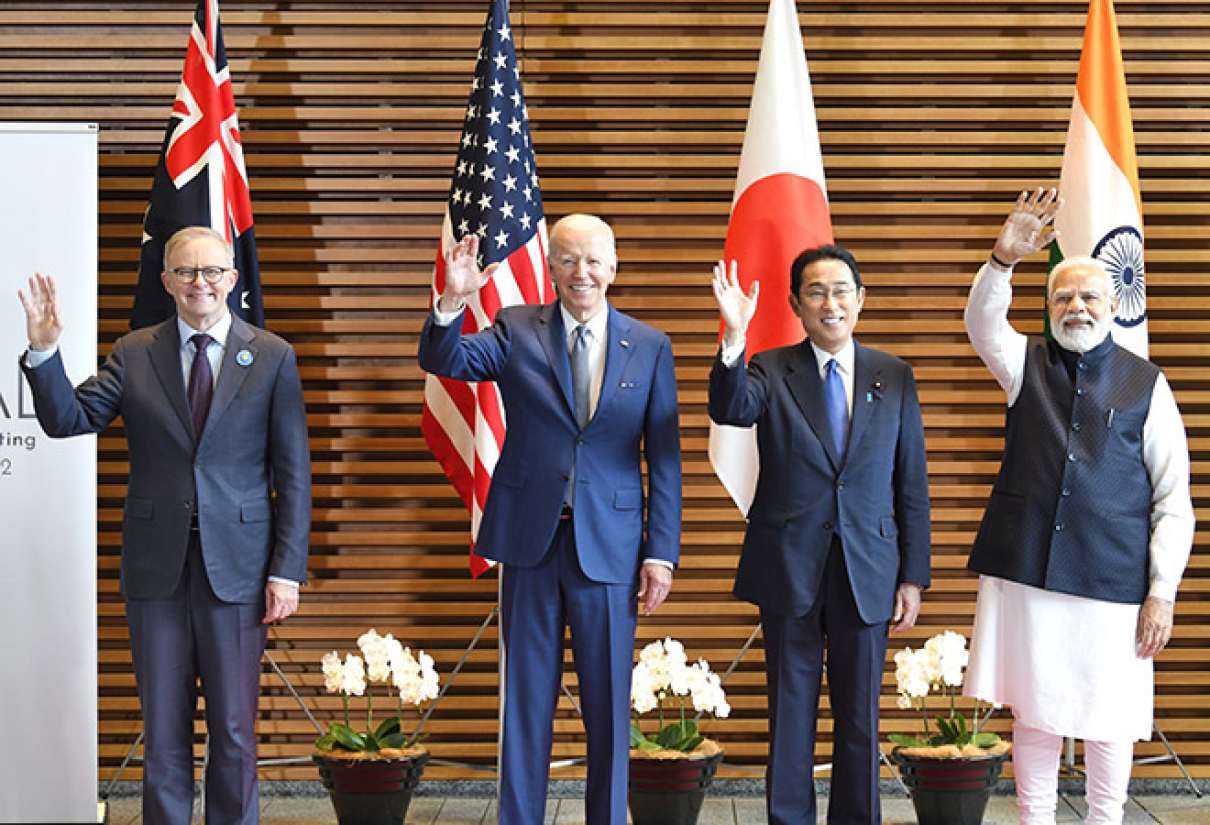Welcoming the ’tilt’ in the UK’s foreign policy towards the Indo-Pacific, the House of Commons Foreign Affairs Committee has recommended that the UK should apply to join the QUAD – the grouping of the US, Australia, Japan, and India, which is fast evolving into a defense and strategic alliance in the Indo-Pacific.
In its latest report titled ‘Tilting Horizons: The Integrated Review and the Indo-Pacific,’ the House of Commons Foreign Affairs Committee asserted that AUKUS was not “purely” about Australia acquiring a fleet of nuclear-powered submarines. The committee advocated welcoming Japan and South Korea to AUKUS to cover the entire Indo-Pacific.
“We see an advantage in working with the Quad to develop a coordinated strategy covering the whole Indo-Pacific maritime area and applying to join the Quad at such time as the existing members feel is appropriate. Given the strength of our bilateral defense relationships with Quad members and the correlation between the UK’s and Quad’s objectives, the UK should seek to join the QUAD,” the Eighth Report of Session 2022–23 report said. The UK government now has two months to respond to it.
The QUAD has been growing in strength with each passing year. A hesitant Australia has also taken a plunge into the grouping as it hosted its first edition of the Malabar Exercise, joined by the US, Japan, and India. The Malabar Exercise had begun as a bilateral naval drill between India and the US. Since then, it has evolved into an alliance of four Indo-Pacific partner nations.
It was in 2020 that Australia joined the maritime drills for the first time and has invited consistent criticism from China. The drills are seen as a collective reaction by QUAD countries to ensure freedom of navigation and security in the Indo-Pacific in the face of growing Chinese aggression. China deployed a swarm of satellites to glean important intelligence from the Malabar Exercise 2023.
Even outside of the framework of QUAD, the countries are engaging with each other bilaterally, sharing information and resources to ensure freedom of navigation in the Indian Ocean Region. India has emerged as a key maritime hub for repairing and refurbishing US warships. Along with this, it has been a vital pit stop for refueling aircraft and warships from Japan and Australia as well.
The House of Commons Committee recognizes China’s military challenge to the UK as by materializing its territorial claims, Beijing would “disrupt vital sea routes connecting us to our major trading partners in the region and probably freeze access to key technologies such as semiconductors.”
“The economic impact of this would be substantial globally, but not as significant as the resulting cost of the sanctions that would need to be enacted against the PRC in response to this hostile action,” adds the report.
The committee suggests that to counter China, the UK needs to work with democratic allies at the receiving end of Beijing’s well-thought-out aggressive policies – like Japan, South Korea, and India. “In confronting an aggressive China, the UK should work with allies to strengthen deterrence that can discourage China from aggression and encourage it to fulfill its international obligations,” the Eighth report suggested.

To ally strongly with the democratic partners, the committee suggests that the UK should impress upon the US and Australia to include Japan and South Korea in AUKUS. Besides helping Australia acquire a fleet of nuclear-powered submarines, AUKUS is about working together on the full suite of advanced technologies, including cyber, Artificial Intelligence, quantum, and undersea technologies, including submarine detection.
“The AUKUS submarine-building program will provide the UK economic, security, and technological benefits. These will be enhanced should “Strand B” cooperation be extended to partners such as Japan and South Korea,” the report suggested. The report concluded that Japan and South Korea’s participation should be restricted to Strand B activities (advanced technologies) through an AUKUS technological defense cooperation agreement.
This multi-pronged cooperation is imperative for the UK government, suggests the report, as China is acquiring ports and naval bases in the Indian Ocean. Purported as the natural extensions of China’s growing economic power, for example, the base in Djibouti may initially be used for PLA Naval vessels fighting piracy and oceanographic survey ships surveying for underwater minerals.
But the report illustrates: “It is likely that survey vessels will also be used for military purposes, including preparation for submarine and underwater drone deployment. Such ports and bases may be used to establish an expanding presence of the PLA Navy, the world’s largest navy in terms of the number of ships, across the world’s oceans.”
Developing alternative maritime routes and strengthening the Royal Navy’s capabilities are imperative; coordination with allies is much needed to deal with threats to the freedom of navigation in the Indo-Pacific.
The UK Should Kick Its China Addiction To Critical Minerals
Apart from the obvious threat that China poses to UK security, other areas warrant the attention of the UK government. Like the dependence on China when it comes to Critical Minerals. The UK government released a Critical Mineral Strategy in 2023, and the report wants the government to step up the work.
The US has taken the lead to reduce its reliance on Beijing in the coming decades. Washington is focusing on aligning with allies through the Mineral Security Partnership (MSP), designed to bolster supply chain security with Australia, Canada, the United Kingdom, France, Germany, Japan, South Korea, and other members.
Securing the supply chains for critical minerals is important as countries veer away from fossil fuels towards clean energy. The demand for critical minerals is expected to increase fourfold by 2040. However, critical mineral supply chains are complex and opaque, the market is volatile and distorted, and China is the dominant player.
The Foreign Affairs Committee has sought a commitment from the government “to publish a new strategy on supply chains; deliver the Critical Minerals Strategy and develop a Semiconductor Strategy that improves the resilience of semiconductor supply chains at home and overseas.”
Information War With China
The committee also touches upon China’s information warfare. The UK Government should, suggests the report, discourage “superficially harmless technologies (e.g., Hikvision surveillance cameras) which are capable of being used for remote data harvesting.”
The report asks the government to launch a national discussion around data release and exfiltration so that the public is better equipped to make responsible decisions about their data.
- Ritu Sharma has been a journalist for over a decade, writing on defense, foreign affairs, and nuclear technology.
- She can be reached at ritu.sharma (at) mail.com




